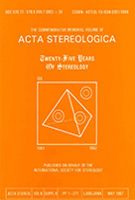Different stereological reaction patterns of the myocardium in hypertrophy induced by exercise and pressure overload
Torsten Mattfeldt,
Institute of Pathology, University of Heidelberg, Im Neuenheimer Feld 220/221, D-6900 Heidelberg, West Germany
Gerhard Mall,
Institute of Pathology, University of Heidelberg, Im Neuenheimer Feld 220/221, D-6900 Heidelberg, West Germany
Karl-Ludwig Krämer,
Institute of Pathology, University of Heidelberg, Im Neuenheimer Feld 220/221, D-6900 Heidelberg, West Germany
Reinhard Zeitz,
Institute of Pathology, University of Heidelberg, Im Neuenheimer Feld 220/221, D-6900 Heidelberg, West Germany
Heinrich Baust,
Institute of Pathology, University of Heidelberg, Im Neuenheimer Feld 220/221, D-6900 Heidelberg, West Germany
Johannes Mann,
Institute of Pathology, University of Heidelberg, Im Neuenheimer Feld 220/221, D-6900 Heidelberg, West Germany
Christoph Hasslacher,
Institute of Pathology, University of Heidelberg, Im Neuenheimer Feld 220/221, D-6900 Heidelberg, West Germany
Rüdiger Waldherr,
Institute of Pathology, University of Heidelberg, Im Neuenheimer Feld 220/221, D-6900 Heidelberg, West Germany
Abstract
Mild cardiac hypertrophy was induced in young female rats by an exercise model and in young male rats by surgical stenosis of the left renal artery. Two randomly selected transverse and longitudinal sections per animal of the left ventricular papillary muscles were studied after fixation by vascular perfusion. Estimates of length density and surface density were corrected for partial anisotropy by means of the Dimroth-Watson orientation distribution. In both models the myocardial cells showed an increase of mean cross-sectional area with unchanged quantitative cytoplasmic ultrastructure. At exercise induced hypertrophy Vv, Sv and Lv of capillaries per tissue volume remained unchanged, whereas all these estimates were significantly decreased at hypertrophy induced by pressure overload. Consequently 3D capillary-fiber ratio was increased at exercise-induced hypertrophy only. The result is discussed as capillary proliferation incited by increased myocardial perfusion at exercise.
Keywords : anisotropy, capillaries, exercise, heart, morphometry, stereology
To cite this article
Torsten Mattfeldt, Gerhard Mall, Karl-Ludwig Krämer, Reinhard Zeitz, Heinrich Baust, Johannes Mann, Christoph Hasslacher & Rüdiger Waldherr, «Different stereological reaction patterns of the myocardium in hypertrophy induced by exercise and pressure overload», Acta Stereologica [En ligne], Volume 4 (1985), Number 2 - Proceedings of the fourth European symposium for stereology - Dec. 1985, 211-216 URL : https://popups.uliege.be/0351-580x/index.php?id=3219.

